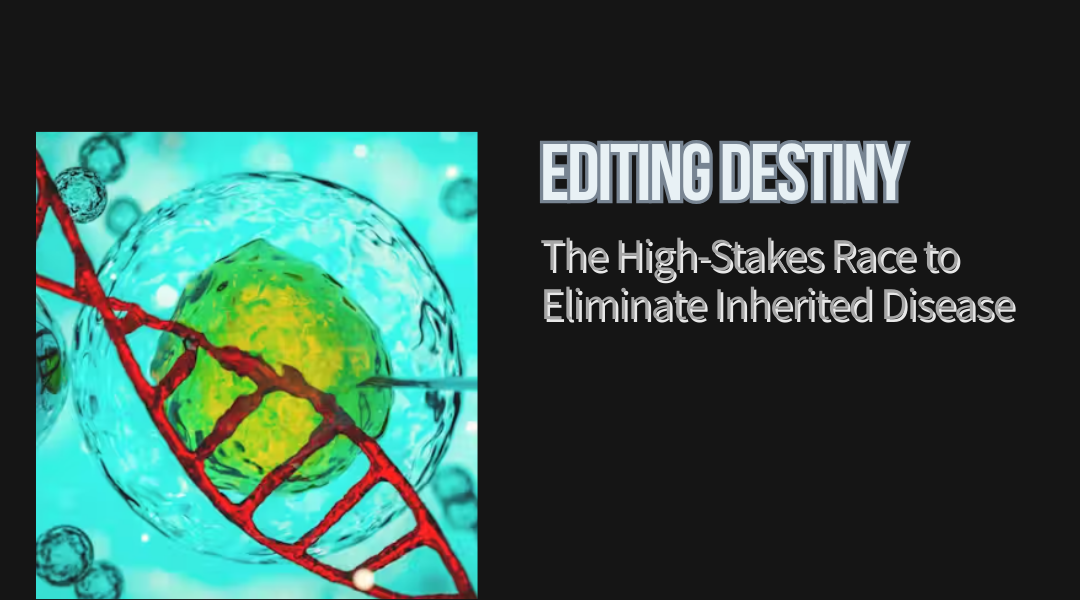The Last Taboo in Medicine
We’ve reached a crossroads where doctors can do more than deliver babies—they can rewrite their genetic futures. Imagine telling parents carrying the Huntington’s gene, “Your child won’t just avoid the disease—none of your descendants will ever suffer from it.” This isn’t hypothetical. In 2023, researchers at Oregon Health & Science University successfully edited the MYBPC3 gene in human embryos, preventing inherited heart failure. The breakthrough was celebrated—and immediately condemned.
How Science is Breaking the Chain of Genetic Fate
The Two Paths Forward
- Embryo Screening (The Conservative Approach)
- Already happening in fertility clinics worldwide
- During IVF, technicians can identify embryos free of BRCA cancer mutations or cystic fibrosis genes
- The catch: This doesn’t fix anything—it just selects unaffected embryos
- Germline Editing (The Genetic Reset Button)
- CRISPR edits made to early-stage embryos become part of every cell, including future sperm or eggs
- In 2022, UK scientists corrected the HEXA gene linked to Tay-Sachs in lab embryos
- The game-changer: These edits would ripple through generations
Real-World Tensions
- A London couple who lost two children to spinal muscular atrophy (SMA) are petitioning for access to germline editing trials
- Meanwhile, bioethicists warn we’re repeating the mistakes of China’s CRISPR baby scandal—just with better PR
The Minefield of Ethics
Who Gets to Play God?
- A startup in Dubai offers “preimplantation genetic enhancement” for wealthy clients—adding disease resistance alongside cosmetic traits
- Contrast this with a Nigerian hospital struggling to afford basic sickle cell treatments
The Consent Paradox
- We require consent for medical procedures, but future generations can’t consent to their DNA being altered
- The counterargument: Is it ethical to knowingly pass on deadly mutations when we have the tools to stop them?
The Slippery Slope
- It starts with eliminating Huntington’s
- Then comes editing out autism-linked genes
- Where does “preventing suffering” end and eugenics begin?
The Global Power Struggle
The Regulatory Patchwork
- USA: No federal ban, but FDA won’t approve trials
- UK: Allowing mitochondrial replacement (“three-parent babies”) but drawing the line at nuclear DNA edits
- China: Shadow labs reportedly continue germline experiments despite official bans
Scientists vs. Society
- 73% of geneticists support germline editing for severe diseases (Nature, 2023)
- 62% of the public oppose it on religious or “unnatural” grounds (Pew Research)
Safer Alternatives?
- Womb Therapies
- Trials injecting CRISPR into fetuses with Duchenne muscular dystrophy show promise
- Only affects the baby, not future generations
- Post-Birth Fixes
- Gene therapies like Zolgensma for SMA cost $2.1 million per treatment
- Cruel irony: It’s cheaper to edit an embryo than treat a living child
The Road Ahead
- WHO predicts first approved germline therapy by 2035
- Underground “biohacker” clinics already offering black-market edits in unregulated countries
- The coming battle: Will this technology liberate humanity from genetic suffering—or create a new era of genetic inequality?
The Uncomfortable Truth
We stand at a threshold where “playing God” might soon be considered medical negligence. The family that could have eliminated breast cancer genes from their lineage but chose not to—will they be seen as irresponsible? As the science outpaces our ethics, one thing becomes clear: We’re not just editing genes. We’re editing what it means to be human.
